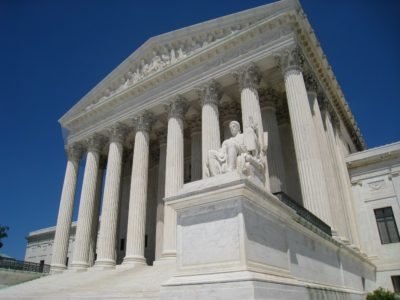 The U.S. Supreme Court issued its decision on June 29, 2023, which makes it more difficult for colleges to consider all aspects of a student’s identity, qualifications and experiences – including their racial and ethnic background – in the admissions process.
The U.S. Supreme Court issued its decision on June 29, 2023, which makes it more difficult for colleges to consider all aspects of a student’s identity, qualifications and experiences – including their racial and ethnic background – in the admissions process.
See IDRA’s Statement: Students’ Racial Diversity Should be Celebrated, Not Minimized or Erased – Supreme Court Ignores History & Precedent in Finding UNC and Harvard Affirmative Action Programs Unconstitutional
IDRA SCOTUS Affirmative Action Response Team
Depending on the ruling coming soon, the loss of affirmative action threatens to further divide our schools, communities and workplaces and undermines our nation’s greatest strength – our multiracial diversity. Regardless of the outcome, we must continue to defend diversity.
- Reporters can contact Thomas Marshall, III, M.Ed. (thomas.marshall@idra.org), to arrange an interview with a team member excerpt: Paige Duggins-Clay, J.D., Chief Legal Analyst, and Celina Moreno, J.D., President & CEO.
- IDRA released a statement when the ruling is handed down.
- We are collaborating with other experts and coalitions.
- See the friend-of-the-court brief that IDRA joined coordinated and filed by the Education Civil Rights Alliance (ECRA).
- Listen and get details on our Classnotes Podcast episode: The Law in Education – Students Press for Affirmative Action.
On October 31, 2022, the U.S. Supreme Court heard two cases that have the potential to radically re-write the rules for colleges to seek and rely on information about students’ race, ethnicity, national origin, and other core identity factors in their admissions decisions. The cases, Students for Fair Admissions, Inc. v. President & Fellows of Harvard College (No. 19-2005) and Students for Fair Admissions, Inc. v. University of North Carolina (No. 21-2263) challenge the schools’ ability to fairly evaluate the qualifications and experience of college applicants and invite the court to depart from decades-old precedent establishing the value of diversity in education.
Background
Due to persistent inequalities in K-12 education, many students of color confront barriers to educational opportunity despite their talent and hard work. Holistic admissions processes that account for these barriers by allowing consideration of a student’s racial and ethnic background are critical to ensuring that all students have a fair opportunity to access college.
On October 31, 2022, the U.S. Supreme Court will hear two cases that have the potential to radically re-write the rules for colleges to seek and rely on information about students’ race, ethnicity, national origin, and other core identity factors in their admissions decisions. The cases, Students for Fair Admissions, Inc. v. President & Fellows of Harvard College (No. 19-2005) and Students for Fair Admissions, Inc. v. University of North Carolina (No. 21-2263) challenge the schools’ ability to fairly evaluate the qualifications and experience of college applicants and invite the court to depart from decades-old precedent establishing the value of diversity in education. The plaintiff, Students for Fair Admission, seeks to dismantle holistic admissions and other policies that successfully create pathways to college for students of color by asking the Supreme Court to overturn its 2003 ruling in Grutter v. Bolinger. Grutter reaffirmed a 1978 case (Regents of the University of California v. Bakke) establishing diversity in the classroom as a compelling state interest under the U.S. Constitution and Title VI of the Civil Rights Act of 1964, holding that colleges could consider race in their admissions policies so long as their affirmative action programs were narrowly tailored to increase student diversity. SFFA argued that the universities in this case discriminate against Asian American students in their admissions process – despite clear evidence to the contrary.
Why does this case matter for diversity in education?
IDRA joined a friend-of-the-court brief coordinated and filed by the Education Civil Rights Alliance (ECRA) on August 1, 2022, demonstrating the importance of ensuring that colleges can consider the many characteristics and experiences that shape a student’s college application, including their racial and ethnic background. A significant portion of the brief highlighted the testimony of students at Harvard and UNC who shared their lived experience as students of color on these highly-selective campuses and the role of their racial-ethnic backgrounds both in their admissions applications and their engagement once matriculated.
Student testimony played a key role in the district court rulings that eliminating race-conscious admissions would preclude talented and qualified students from successfully contextualizing the merit and experiences they possess because of their racial or ethnic identity. For example, Itzel Vasquez-Rodríguez, a Harvard graduate with Chicana and Indigenous identities, discussed the potential impact of eliminating race-conscious admissions by reflecting on her own application experience: “Should the Supreme Court decide that schools are barred from considering grace and admissions… I really don’t know how I would have applied to college. I think everything that I’ve done, the way that I see the world and the way that the world sees me is through a particular lens.”
In IDRA’s podcast interview, she continued, “For instance, my name my name is Itzel, which is a variation of the Maya word ichel, and it’s a pretty common name in Mexico. It’s a name with indigenous roots. So even so far, it’s just my first name. I don’t know how I would describe my life or myself without referencing my ethnicity and racial identity.”
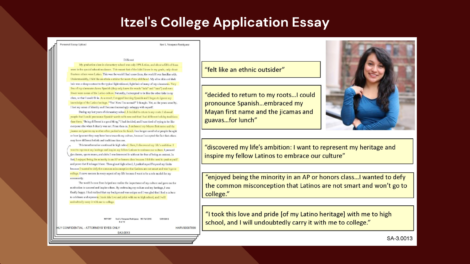 Itzel also described a powerful moment during the hearing in the Harvard case, where LCCR attorneys demonstrated the potential ramifications of court-imposed censorship: “There was a point during our testimony back in 2018 for the Harvard admissions case where part of my essay was shown on the screen, and half of the essay was blacked out. And those blacked-out parts were points where I referenced my identity in some way. I’m not sure how admissions folks would be able to read any of my essays or really interpret any of my admissions packet if they’re not allowed to take my identity into consideration.”
Itzel also described a powerful moment during the hearing in the Harvard case, where LCCR attorneys demonstrated the potential ramifications of court-imposed censorship: “There was a point during our testimony back in 2018 for the Harvard admissions case where part of my essay was shown on the screen, and half of the essay was blacked out. And those blacked-out parts were points where I referenced my identity in some way. I’m not sure how admissions folks would be able to read any of my essays or really interpret any of my admissions packet if they’re not allowed to take my identity into consideration.” 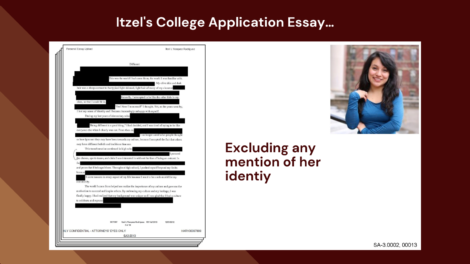 Andrew Brennen, a UNC graduate, built on this sentiment, noting that barring colleges from considering race would have undermined his ability to describe the way that his intersecting identities and background made him a strong candidate for UNC: “I was a Black kid in schools that were mostly white, in classes that were mostly white, in a kind of culture that really was quite homophobic I deeply understood what it felt like to be marginalized in spaces and to be feeling like I was invisible.”
Andrew Brennen, a UNC graduate, built on this sentiment, noting that barring colleges from considering race would have undermined his ability to describe the way that his intersecting identities and background made him a strong candidate for UNC: “I was a Black kid in schools that were mostly white, in classes that were mostly white, in a kind of culture that really was quite homophobic I deeply understood what it felt like to be marginalized in spaces and to be feeling like I was invisible.”
He explained on the podcast: “When I applied to college, frankly, I was still working through how my different identities intersect with one another and how that relates to kind of how I was interacting with the world. The idea that somehow, someone would be able to evaluate my qualifications for admission to the university without understanding a core element to how I understood my application to that university and as myself as a person at the time just is really confusing to me.” In addition to the harm to individual students censored in the admissions process, an adverse ruling by the Supreme Court will also hurt colleges, who will lose an important tool to build vibrant, inclusive communities reflective of our nation’s diversity. “I want to encourage advocates and folks talking about this and everyone to just remember that we don’t have to be vulnerable to these kind of zero-sum pathologies,” Andrew said. “Having diverse campuses and workplaces and institutions supports everyone. Improves everyone’s experience. Improves outcomes for everyone.”
Learn more about the students and attorneys featured on IDRA’s podcast
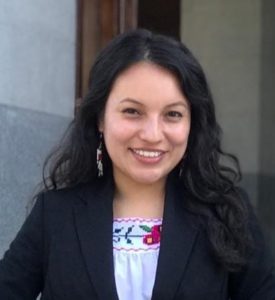 Itzel Vasquez-Rodríiguez
Itzel Vasquez-Rodríiguez
Itzel Vasquez-Rodríiguez (Pronouns: she/her/ella) is a 2017 Harvard College graduate and one of the Amici student witnesses in the Harvard admissions lawsuit. At Harvard, Itzel was a leader in Latine and Native American affinity groups on campus, as well as ethnic studies advocacy coalitions. Originally from Lakewood, Calif., Itzel is a proud Xicana of Cora descent and has a background in legislation, research, non-profit work, and advocacy in BIPOC communities. Itzel previously served as an engagement coordinator for the California State Water Board, where she worked in the tribal affairs program and the SAFER drinking water program. Prior to that, Itzel worked as an assembly fellow with Assemblymember Cecilia Aguiar-Curry’s office. Itzel is now a first-year graduate student in the master of public policy program with a focus on water policy at UCLA’s Luskin School of Public Affairs.
 Andrew Brennan
Andrew Brennan
Andrew Brennan attended the University of North Carolina at Chapel Hill and received a bachelor’s degree in political Science. He is currently pursuing a master’s in education policy and management at the Harvard Graduate School of Education. As an associate at Omidyar Network, Andrew conducts research and analysis to inform the programmatic portfolio and actively engages across its investment and stakeholder network to reimagine critical systems and the ideas that govern them. Prior to Omidyar Network, Andrew served as a National Geographic 2020 education fellow supporting youth-led movements and organizations around the globe. He co-founded the Kentucky Student Voice Team, which helps to amplify and elevate students as partners in improving Kentucky schools. Before that Andrew worked as the national field director for Student Voice, interned then consulted for the Obama Foundation’s program team and served in strategic communication roles at APCO Worldwide and Hattaway Communications.
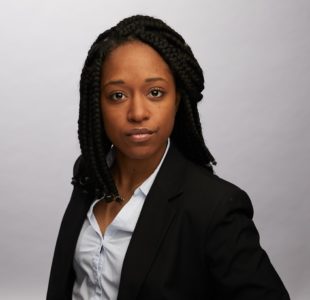 Taylor A. Dumpson, J.D.
Taylor A. Dumpson, J.D.
Taylor A. Dumpson, J.D., is associate counsel at the Lawyers’ Committee for Civil Rights Under Law. Ms. Dumpson was born in Washington, D.C., and raised on Maryland’s Eastern Shore. After graduating from Wicomico High School, she received her bachelor’s degree in law and society with a concentration in social science from American University and her J.D. with a concentration in rights and the state from the Benjamin N. Cardozo School of Law. In spring 2017, while pursuing her bachelor of arts degree at American University in the Nation’s Capital, Ms. Dumpson became the first Black woman to serve as president of the student government in the university’s 124-year history. In the wake of her ground-breaking election, she was the target of a racially-motivated hate crime on her first day in office, followed by cyber-harassment by members of white supremacist groups. However, Ms. Dumpson did not allow these acts to deter her from her goal of becoming a civil rights attorney, nor did she let it break her. Instead, Ms. Dumpson fought back by pursuing litigation against the Neo-Nazis who cyber-harassed her, winning a landmark settlement based on principles of restorative justice.
Learn more about the Harvard and UNC Supreme Court Cases
Defend Diversity website Amicus brief: Students for Fair Admissions, Inc. v. Harvard and UNC, August 1, 2022 Supreme Court Should Reaffirm Diversity as Compelling Interest, Uphold Holistic College Admissions, IDRA Statement, August 4, 2022 SCOTUS Blog: Students for Fair Admissions Inc. v. President & Fellows of Harvard College SCOTUS Blog: Students for Fair Admissions, Inc. v. University of North Carolina Students for Fair Admissions vs. University of North Carolina at Chapel Hill, Lawyers’ Committee for Civil Rights Under Law

